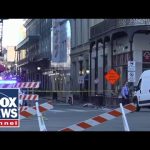In a recent discussion on national security, experts shed light on a troubling incident involving a suspect linked to potential terrorist activities. They expressed concerns that this individual, identified as Shamsud-Din Jabbar, did not act alone, suggesting that there may be more individuals on the loose capable of similar attacks. This revelation is alarming to law enforcement and the general public alike, as it raises questions about the effectiveness of current counter-terrorism efforts.
The panel featured notable figures, including former officials from the FBI and the Department of Homeland Security, who shared their insights into the situation. It was emphasized that a comprehensive investigation is underway, highlighting a “full-court press” approach. This means that a variety of law enforcement agencies, including the FBI and international intelligence partners, are working tirelessly to uncover the full extent of the network associated with Jabbar. Evidence from the scene, including improvised explosive devices (IEDs) and firearms, is being meticulously analyzed. Investigators are also combing through Jabbar’s digital footprint, seeking clues that could lead them to any co-conspirators.
A particularly worrisome detail raised during the discussion was Jabbar’s connection to ISIS. The terror group has a history of implementing brutal tactics, often employing secondary attacks as first responders arrive at the scene. Jabbar was reportedly found with an ISIS flag, which has led to speculation about a broader plan. There were indications that he may have intended to execute a more significant attack and that New Orleans was a fallback target when primary plans did not materialize. The presence of numerous surveillance cameras on Bourbon Street could provide valuable information as authorities seek to piece together the timeline of events.
Further complicating the landscape of national security is the argument that some government agencies have lost sight of their primary mission. Some experts suggest that prominent counter-terrorism efforts have been misguided, focusing too much on domestic groups rather than the real threat posed by international terror networks. This shift in focus, they argue, has weakened the ability to prevent attacks like the one being investigated. Evidence suggests that past administrations have prioritized concerns about domestic extremism over examining the actual structures behind terror organizations.
As this situation unfolds, the implications for law enforcement and national security are profound. The challenges posed by disorganized domestic threats must be balanced with the reality of international terrorism. With the potential for further incidents, authorities need to recalibrate their focus. This includes not only addressing the root causes of radicalization but also ensuring robust and effective counter-terrorism measures. Experts agree that time is of the essence, and the nation must remain vigilant against emerging threats as investigations continue.




